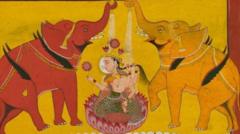An emerging trend shows that specialty coffee is steadily enhancing its presence in the northern regions of India. With younger populations and a shift in preferences, cafes are quickly becoming the new cultural hubs.
Embracing the Coffee Culture: Specialty Brews Transform Small-Town India

Embracing the Coffee Culture: Specialty Brews Transform Small-Town India
The rise of specialty coffee is reshaping the beverage landscape in northern India, traditionally dominated by tea.
In Jalandhar, Harmanpreet Singh shifted from his family bakery to launch Buland Café during the pandemic in 2021, responding to a growing interest in specialty coffee among local youth. Unlike the southern states known for strong, frothy coffee served in steel tumblers, the extreme north has long been rooted in tea culture. However, the Covid-19 pandemic sparked new demand, particularly from youth and expats returning home.
Seizing the moment, Singh apprenticed in Bengaluru to master the art and science of coffee brewing. He opened Buland Café, which has now expanded to 40 outlets that serve a range of meticulously roasted coffee beans sourced from Karnataka. With an emphasis on creating a warm and flavorful coffee experience, Singh personally trained his staff on brewing methods and machine care.
According to a report from CRISIL, over 44% of the Indian population now drinks coffee, revealing a significant increase from tea, a beverage often synonymous with Indian culture. As remote work flourishes, tier-two cities are witnessing a newfound thirst for coffee gatherings and trendy cafes, as owners adapt to consumer preferences for smaller batch roasts and customized brews.
Bharat Singhal, founder of Billi Hu Roasteries, highlights that today's consumers are more discerning, asking questions about their coffee’s origins and roasting methods. Subscription services for coffee have surged by 50% in the past year, pointing to a major shift from traditional brewing methods to more sophisticated equipment like espresso machines.
Classical coffee culture has roots in the early 1900s with the establishment of Indian Coffee Houses, which became crucial hubs for social interaction and political discourse. During the economic liberalization of the 1990s, coffee shops like Café Coffee Day became mainstream, offering a gathering place for youth until financial struggles led to a decline.
The introduction of global giants like Starbucks in 2012 revived interest in coffee, giving rise to homegrown brands that resonate with consumers seeking unique experiences. Social media plays a significant role as well; as Mr. Singh notes, people not only look for good coffee but also desire aesthetically pleasing settings.
Emerging entrepreneurs like Nishant Sinha are also investing in creating trendy environments for coffee enjoyment. His Roastery Coffee House provides a cozy spot marked by stylish decor and an array of coffee options sourced from the southern Indian estates, merging north Indian culinary traditions with high-quality brews. Others, such as Jatin Khurana from Ludhiana, are experimenting with flavors to appeal to nostalgic tastes through innovative menu items like the "Shadi Wali Coffee."
While the coffee market expands, challenges persist. Small coffee shop owners often cut corners, jeopardizing quality by opting for inferior equipment or inexperienced staff. Neha Das and Nishant Ashish, founders of The Eden’s café in Ranchi, strive for a balance between longevity and profit through dedication to local flavors and community engagement.
As the coffee culture takes root in northern India, it signifies not just a beverage choice, but a potential for social transformation and economic opportunity in the region.























